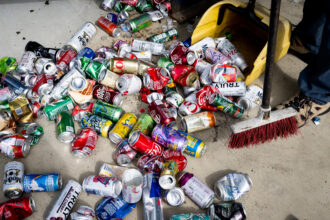
forever chemicals


North Carolina Environmental Regulators at War Over Water Rules for ‘Forever Chemicals’
By Lisa Sorg

Texas Companies Eye Pecos River Watershed for Oilfield Wastewater
By Martha Pskowski, Dylan Baddour

PFAS Is an Almost Impossible Problem to Tackle—and It’s Probably in Your Food
Interview by Jenni Doering, Living on Earth

Petrochemicals Are Killing Us, a New Report Warns in the New England Journal of Medicine
By Liza Gross

Chemours and DuPont Knew About Risks But Kept Making Toxic PFAS Chemicals, UN Human Rights Advisors Conclude
By James Bruggers

Q&A: Everyday Plastics Are Making Us Sick—and Costing Us $250 Billion a Year in Healthcare
Interview by Steve Curwood, Living on Earth

Pennsylvania’s Gas Industry Used 160 Million Pounds of Secret Chemicals From 2012 to 2022, a New Report Says
By Jon Hurdle

Watchdog Finds a US Chemical Plant Isn’t Reporting Emissions of Climate Super-Pollutants and Ozone-Depleting Substances to Federal Regulators
By Phil McKenna

‘Profit Over the Public’s Health’: Study Details Efforts by Makers of Forever Chemicals to Hide Their Harms
By Victoria St. Martin

Q&A: The Power of One Voice, and Now, Many: The Lawyer Who Sounded the Alarm on ‘Forever Chemicals’
By Victoria St. Martin

Plastic Recycling Plant Could Send Toxic ‘Forever Chemicals’ Into the Susquehanna River, Polluting a Vital Drinking Water Source
By James Bruggers

Environmentalists Praise the EPA’s Move to Restrict ‘Forever Chemicals’ in Water and Wonder, What’s Next?
By Victoria St. Martin

Destroying ‘Forever Chemicals’ is a Technological Race that Could Become a Multibillion-dollar Industry
By Chloe Johnson, Star Tribune

